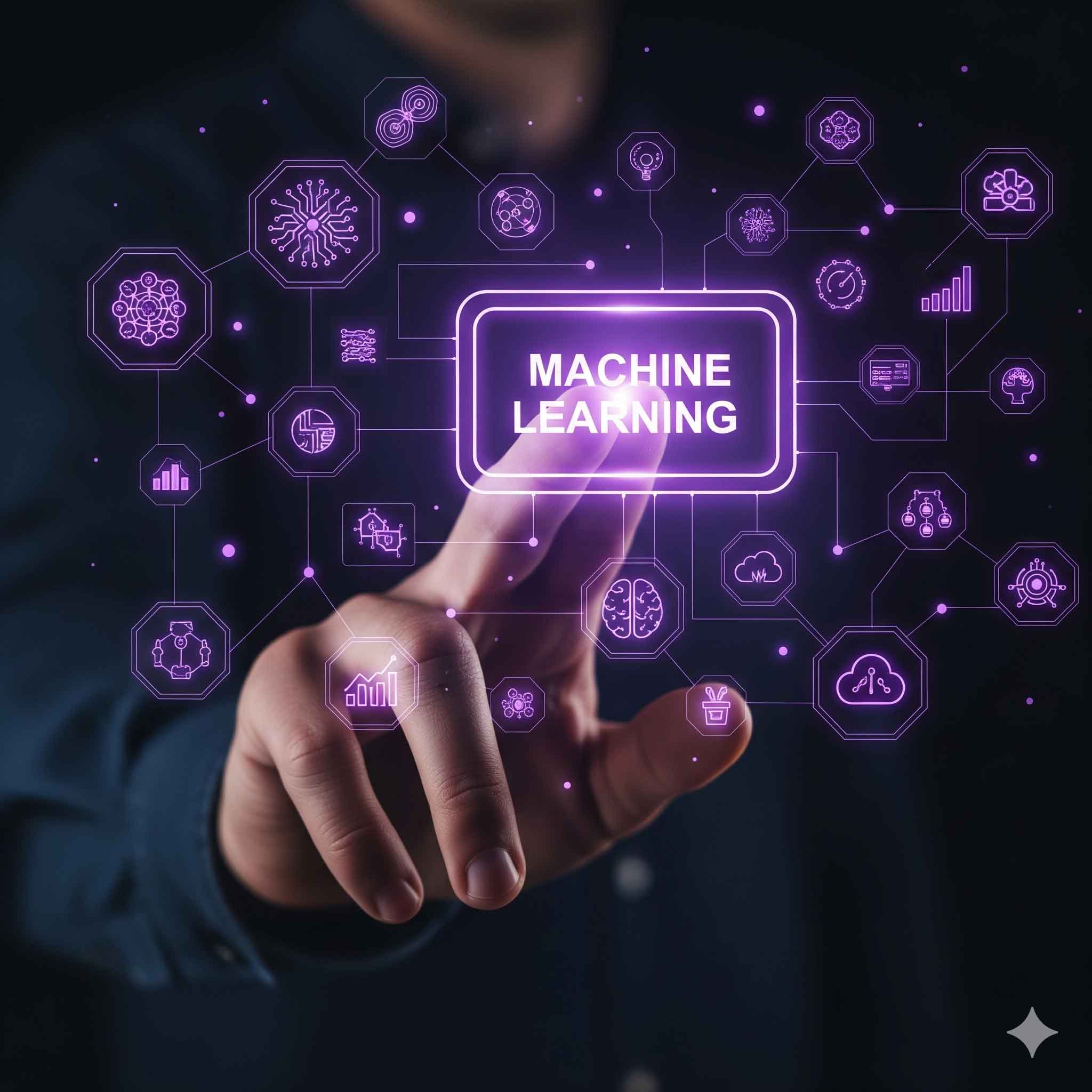Description
Course Description
This 6-month certification program provides a comprehensive and hands-on introduction to Machine Learning (ML). Students will learn the fundamental concepts, algorithms, and techniques behind modern ML systems while also gaining practical experience through coding labs,
mini-projects, and a final guided capstone project.
The course blends theory, mathematics, and programming practice to build a strong foundation. By the end of the program, learners will be able to design, implement, evaluate, and deploy ML solutions across real-world domains such as healthcare, finance, natural language processing (NLP), and computer vision, with an awareness of AI ethics, bias, and fairness.
Intended Audience
- Undergraduate students (3rd year and above) in Computer Science, IT, Electronics, Data Science, or related fields
- Postgraduate students seeking applied ML skills
- Early-career professionals or enthusiasts aiming to switch to AI/ML career tracks
- Learners with basic programming knowledge who want structured training with practice
Prerequisite Knowledge
To succeed in this course, learners should have:
- Mathematics: High school level linear algebra, probability, and calculus basics (refresher provided)
- Programming: Basic knowledge of Python (variables, loops, functions, lists, dictionaries)
- Statistics: Basic descriptive statistics and probability distributions
- Enthusiasm for solving problems with data and exploring AI
Course Highlights
- Balanced Curriculum: Covers ML theory, algorithms, practical applications, and ethics
- Hands-On Learning: Weekly coding labs, assignments, quizzes, and mini-projects
- Capstone Project: Guided 2-week project with real-world datasets from healthcare, finance, NLP, or vision
- Industry-Relevant Skills: Feature engineering, model building, deep learning, deployment, and explainability
- Tools & Libraries: Python, NumPy, Pandas, Matplotlib, Scikit-Learn, TensorFlow/Keras, PyTorch (intro)
- Ethics & Responsible AI: Learn bias detection, fairness evaluation, and explainable AI techniques
- Flexible Learning: Combination of online conceptual classes and offline practical sessions
- Portfolio Ready: Students graduate with projects, a deployed ML app, and a capstone project to showcase
Module 1: Foundational Skills and ML Introduction (16 hrs)
Topics
- Introduction to ML applications
- Supervised vs. unsupervised learning paradigms
- ML pipeline
- Ethics in AI
- Python refresher (NumPy, Pandas, Matplotlib, Seaborn).
- Git basics
- Linear Algebra (vectors, matrices, dot product)
- Probability & Stats (distributions, Bayes’ Theorem)
- Calculus (derivatives, gradients)
- Optimization (GD, SGD, Adam, learning rate)
Learning Outcomes
- Understand the fundamental concepts of machine learning and its applications.
- Be proficient in using Python libraries for data manipulation and visualization.
- Grasp the core mathematical concepts that underpin ML algorithms.
- Set up a professional development environment with version control.
Labs / Hands-on
- Python and Jupyter notebook setup.
- Data exploration and visualization using a real-world dataset.
- Implementing basic linear algebra and calculus operations in Python
Assessment
- Quiz 1: Covers introductory concepts, Python basics, and Git commands.
- Lab Assignment 1: Analyze and visualize a dataset, submitting the notebook via Git.
- Mini-Project: A small project involving data cleaning and basic visualization.
Module 2: Supervised Learning & Model Evaluation (16 hrs)
Topics
- Data cleaning, missing values, encoding, normalization
- train-test split
- Linear and Polynomial Regression
- Regularization (Ridge, Lasso)
- Regression metrics (RMSE, R2)
- Logistic Regression
- k-NN, Decision Trees, Naive Bayes
- Classification metrics (accuracy, precision, recall, F1, ROC)
- Bias-variance tradeoff
- Cross-validation and hyperparameter tuning.
Learning Outcomes
- Prepare data for supervised learning models.
- Build and evaluate both regression and classification models.
- Understand and apply various evaluation metrics.
- Tune hyperparameters to improve model performance.
Labs / Hands-on
- Data preprocessing and feature engineering.
- Implementing and comparing different regression models.
- Building and evaluating various classification models.
- Using cross-validation and hyperparameter tuning on a chosen model.
Assessment
- Quiz 2: Covers data preprocessing, regression, and classification theory.
- Lab Assignment 2: Implement a complete regression pipeline, including preprocessing and model evaluation.
Module 3: Advanced Supervised & Unsupervised Techniques (16 hrs)
Topics
- Ensemble methods (Bagging, Boosting, Random Forest, AdaBoost, Gradient Boosting, XGBoost)
- Unsupervised learning (k-Means, Hierarchical, DBSCAN)
- Anomaly detection
- Dimensionality reduction (PCA, LDA, t-SNE)
Learning Outcomes
- Utilize powerful ensemble methods to build more accurate models.
- Apply unsupervised learning techniques for clustering and anomaly detection.
- Reduce data dimensionality for improved model performance and visualization.
Labs / Hands-on
- Implementing and comparing different ensemble methods on a classification task.
- Applying clustering algorithms to an unlabeled dataset.
- Using PCA for dimensionality reduction and visualizing the results.
Assessment
- Quiz 3: Covers ensemble methods, clustering, and dimensionality reduction.
- Mini-Project: Perform an unsupervised learning task (e.g., customer segmentation) on a dataset.
Module 4: Neural Networks and Deep Learning (16 hrs)
Topics
- Perceptrons
- Feedforward NNs
- Backpropagation
- activation functions
- loss functions
- Regularization (dropout, batch norm)
- CNN basics (convolution, pooling)
- Architectures (LeNet, AlexNet, ResNet)
- Transfer learning
- Intro to RNNs/LSTMs
Learning Outcomes
- Understand the fundamentals of deep learning and neural networks.
- Build and train a simple neural network from scratch.
- Apply CNNs for image classification and utilize transfer learning.
- Grasp the basics of processing sequential data with RNNs/LSTMs.
Labs / Hands-on
- Building a simple feedforward neural network.
- Implementing a CNN for an image classification task.
- Using a pre-trained model with transfer learning.
Assessment
- Quiz 4: Covers deep learning concepts, CNNs, and RNNs.
- Lab Assignment 3: Build a complete image classification model using a CNN and transfer learning.
Module 5: Specialized ML and Deployment (16 hrs)
Topics
- Intro to NLP (Bag-of-Words, TF-IDF)
- Word embeddings (Word2Vec, GloVe)
- Transformers
- Time series (ARIMA, LSTMs)
- SVM
- Autoencoders
- Recommender Systems
- Reinforcement Learning
- Flask/Streamlit deployment
- Docker basics
- MLOps concepts (CI/CD, model monitoring, reproducibility).
Learning Outcomes
- Process and analyze text data using NLP techniques.
- Develop a basic time series forecasting model.
- Understand specialized models like SVMs and Recommender Systems.
- Deploy a machine learning model as a web application.
Labs / Hands-on
- NLP lab on text processing and sentiment analysis.
- Building a time series forecasting model.
- Deploying a trained model using Flask or Streamlit.
Assessment
- Quiz 5: Covers NLP, time series, and deployment concepts.
- Mini-Project: Build a recommender system or a time series forecasting model and present the results.
Module 6: Case Studies and Capstone Project (16 hrs)
Topics
- Case studies across domains (CV, NLP, healthcare, finance)
- Project scoping and proposal writing
- Dataset exploration and planning
- Implementation, evaluation, and presentation
Learning Outcomes
- Integrate all learned skills to solve a real-world problem.
- Manage a complete ML project lifecycle from start to finish.
- Effectively communicate project findings.
- Develop a porfolio-worthy project.
Labs / Hands-on
- This entire module is a hands-on, project-based learning experience. Students work on a single, comprehensive capstone project.
Assessment - Project Proposal: A written document outlining the problem, dataset, and planned approach.
- Final Project: The completed ML project, including code and a polished report.
- Final Presentation: A presentation of the project, including the problem, methodology, and results.
Sample Project Ideas
- Predict disease risk or patient outcomes from structured or unstructured medical data.
- Sentiment analysis, fake news detection, or topic modeling on social media data.
- Build an image classifier or object detector for a domain-specific application.
- Stock price/cryptocurrency forecasting, fraud detection, or credit risk modeling.
- Predict traffic congestion, pollution, or energy usage.
Assessment
- Final Project Evaluation (40%)
- Viva & Presentation (10%)
Course Assessment Scheme (6 Months)
- Quizzes (5 × 4%) → 20%
- Assignments & Lab Reports → 15%
- Mini-projects → 15%
- Final Project (report + code + presentation + viva) → 50%




